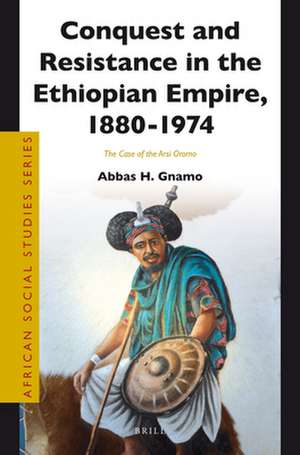Conquest and Resistance in the Ethiopian Empire, 1880 - 1974: The Case of the Arsi Oromo: African Social Studies Series, cartea 32
Autor Abbas Gnamoen Limba Engleză Paperback – 22 ian 2014
Din seria African Social Studies Series
- 15%
 Preț: 400.26 lei
Preț: 400.26 lei - 15%
 Preț: 421.76 lei
Preț: 421.76 lei - 15%
 Preț: 521.68 lei
Preț: 521.68 lei - 15%
 Preț: 395.90 lei
Preț: 395.90 lei - 18%
 Preț: 558.05 lei
Preț: 558.05 lei - 15%
 Preț: 397.83 lei
Preț: 397.83 lei - 15%
 Preț: 398.74 lei
Preț: 398.74 lei - 15%
 Preț: 398.33 lei
Preț: 398.33 lei - 15%
 Preț: 398.48 lei
Preț: 398.48 lei - 15%
 Preț: 398.00 lei
Preț: 398.00 lei - 15%
 Preț: 399.69 lei
Preț: 399.69 lei - 15%
 Preț: 400.90 lei
Preț: 400.90 lei - 38%
 Preț: 398.48 lei
Preț: 398.48 lei - 15%
 Preț: 395.83 lei
Preț: 395.83 lei - 15%
 Preț: 402.26 lei
Preț: 402.26 lei - 15%
 Preț: 397.68 lei
Preț: 397.68 lei - 15%
 Preț: 400.09 lei
Preț: 400.09 lei - 15%
 Preț: 395.68 lei
Preț: 395.68 lei - 15%
 Preț: 397.68 lei
Preț: 397.68 lei - 15%
 Preț: 400.50 lei
Preț: 400.50 lei - 15%
 Preț: 396.88 lei
Preț: 396.88 lei - 15%
 Preț: 399.69 lei
Preț: 399.69 lei - 15%
 Preț: 397.36 lei
Preț: 397.36 lei - 15%
 Preț: 402.52 lei
Preț: 402.52 lei - 15%
 Preț: 400.50 lei
Preț: 400.50 lei - 15%
 Preț: 393.65 lei
Preț: 393.65 lei - 15%
 Preț: 369.64 lei
Preț: 369.64 lei - 15%
 Preț: 397.68 lei
Preț: 397.68 lei - 15%
 Preț: 369.86 lei
Preț: 369.86 lei - 15%
 Preț: 363.98 lei
Preț: 363.98 lei - 15%
 Preț: 397.36 lei
Preț: 397.36 lei - 15%
 Preț: 368.51 lei
Preț: 368.51 lei - 15%
 Preț: 368.51 lei
Preț: 368.51 lei - 15%
 Preț: 396.06 lei
Preț: 396.06 lei - 15%
 Preț: 414.62 lei
Preț: 414.62 lei - 15%
 Preț: 394.14 lei
Preț: 394.14 lei -
 Preț: 365.91 lei
Preț: 365.91 lei - 15%
 Preț: 394.71 lei
Preț: 394.71 lei - 15%
 Preț: 445.38 lei
Preț: 445.38 lei - 15%
 Preț: 396.38 lei
Preț: 396.38 lei - 15%
 Preț: 403.98 lei
Preț: 403.98 lei - 15%
 Preț: 397.68 lei
Preț: 397.68 lei - 15%
 Preț: 401.39 lei
Preț: 401.39 lei - 15%
 Preț: 397.93 lei
Preț: 397.93 lei
Preț: 399.28 lei
Preț vechi: 469.75 lei
-15% Nou
Puncte Express: 599
Preț estimativ în valută:
76.40€ • 79.100$ • 63.37£
76.40€ • 79.100$ • 63.37£
Carte indisponibilă temporar
Doresc să fiu notificat când acest titlu va fi disponibil:
Se trimite...
Preluare comenzi: 021 569.72.76
Specificații
ISBN-13: 9789004258136
ISBN-10: 9004258132
Pagini: 370
Dimensiuni: 155 x 235 x 23 mm
Greutate: 0.59 kg
Editura: Brill
Colecția Brill
Seria African Social Studies Series
ISBN-10: 9004258132
Pagini: 370
Dimensiuni: 155 x 235 x 23 mm
Greutate: 0.59 kg
Editura: Brill
Colecția Brill
Seria African Social Studies Series
Notă biografică
Abbas H. Gnamo, B.A (Addis Ababa University), M.A, Ph.D. & DEA (Paris University I, Panthéon-Sorbonne), has authored a monograph, and many articles on Ethiopia and the Oromo as well as chapters in books on the Rwandan Genocide (1999 & 2006). He began his career at Addis Ababa University, Institute of Ethiopian Studies and has been affiliated with several research centres in Canada. He has taught at some major Canadian universities including Ryerson, York and the University of Toronto
Recenzii
'Gnamo (political science, Ryerson Univ.) organized his study into two general categories. The first is anthropological; the author discusses the traditional cultural and socioeconomic structures and political institutions of the Arsi Oromo. The second, which takes up the bulk of the book, is concerned with their place in the Ethiopian political, social, and economic landscape. In discussing the conquest of the Oromo and their subsequent resistance, the author points out that the Ethiopian state did nothing to integrate them, in any capacity, into the Ethiopian sociopolitical order. Gnamo makes a case for the exploitative and extractive nature of the relationship between the Christian-Ethiopian core and the Oromo periphery. Brutal suppression and continual repression resulted in continual Oromo resistance to the central government and was a major factor in the Arsi Oromo conversion to Islam. The people remained marginal throughout the period under consideration, and the author fears that unless the present government undertakes fundamental structural alterations, there will be no change. Gnamo did fieldwork among the Arsi Oromo using both Oromo and Amhara languages to conduct his interviews. The bibliography contains most relevant written sources in the major European languages; maps and charts bring greater clarity to the narrative. Summing Up: Recommended. Upper-division undergraduates and above'.
--T. Natsoulas, emeritus, University of Toledo, in Choice, August 2014
--T. Natsoulas, emeritus, University of Toledo, in Choice, August 2014
